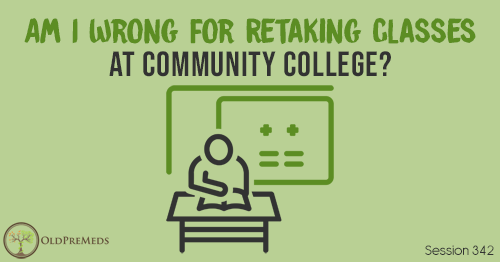Apple Podcasts | Google Podcasts
Session 340
After receiving interview feedback from an admissions committee, this nontrad is questioning if their only way into medical school is to pursue an SMP.
Questions answered here on the podcast are taken directly from premedhangout.com. Go ask your questions there and use #OPMquestion.
Also, please be sure to check out all our other podcasts on Meded Media as we try to bring you as many resources as you need on this journey.
Listen to this podcast episode with the player above, or keep reading for the highlights and takeaway points.
The MCAT Minute
The MCAT Minute is brought to you by Blueprint MCAT.
- As a non-traditional student juggling various responsibilities, finding efficient ways to manage your time is crucial. One valuable resource available is the Blueprint MCAT study planner tool. This free tool allows you to create a personalized study plan that aligns with your schedule and commitments.
- By visiting blueprintmcat.com and signing up for a free account, you can access this tool along with other helpful resources. With the study planner tool, you can effectively plan out your MCAT preparation and ensure that it fits seamlessly into your busy life as a non-traditional student.
OldPreMeds Question of the Week
“I graduated back in 2015 with a non science degree. I first entered college in 2008 as a biology major, but faced personal challenges that caused me to withdraw from classes and ultimately, college.
I have recently gone back and completed all science prereqs with A’s. I did get an interview this round, but was told by the admissions committee they are worried about my ability to handle the academic science rigor with the recommendation to do their SMP bridge program.
How can I prove my ability when I already obtained A’s and prereqs while working full-time is my only option in an SMP program.”
Proving Academic Capability
The story of a student who initially quit college, returned after seven years, and is now undertaking postbac coursework to achieve academic success is both inspiring and intriguing.
However, without access to specific data, such as the details of your upward trend and the number of credits earned with those A’s, we can only speculate on various hypothetical scenarios.
It is worth noting that the student was granted an interview by a particular school, indicating that they had enough confidence in the applicant to consider them for admission. However, it is important to consider if this school interviews all in-state applicants or if it follows a different selection process.
“There are a few schools out there that will interview all of their in-state applicants.”
The availability of resources and faculty bandwidth often influences a school’s ability to conduct interviews with all applicants. This applies particularly to states with larger premed populations like California, New York, Florida, and Texas.
Assessing the Prerequisite Credits
Though the exact number of prerequisite credits is unknown, we can make assumptions based on common prerequisites for science courses.
For example, assuming that the student completed general chemistry (with labs) for two semesters (8 credits), biology (with labs) for two semesters (16 credits), and physics (with labs) for two semesters (8 credits). The total would amount to 32 credits. If additional prerequisites were included, the total could potentially reach around 35 or 40 credits.
An Indicator of Interest and Competence
When a school grants an interview, it signifies a certain level of confidence in an applicant’s qualifications and potential. This suggests that something in their application, such as their academic performance or other factors, piqued the school’s interest. However, in some cases, even after the interview, concerns may linger, leading to the suggestion of participating in a bridge program.
The Purpose of Bridge Programs
Bridge programs serve as a transitional year or preparatory program for students who need additional support before starting their regular coursework. These programs aim to address any concerns that were not alleviated during the interview process.
While the availability and cost of bridge programs can vary across institutions, there are instances where these programs are offered free of charge or with scholarships available.
A Case Example
An excellent illustration of a bridge program is one recently featured on the “Premed Years” podcast, where a student participated in a free bridge program through Michigan State University. In this scenario, the student was accepted into the program with the understanding that they would complete the preparatory year. The term “year prep program” is often used to describe these types of bridge programs. It’s important to note that without specific information about the school in question, it is uncertain if the situation described aligns with Michigan State or another institution.
Viewing Education through a Business Lens
There is a perspective that suggests thinking of schools as businesses, where they may try to steer students towards certain programs or paths that can generate revenue. This viewpoint implies that schools are primarily focused on financial gains rather than solely prioritizing the best interests of the students.
“You have to think of school as a business.”
In this context, schools may recommend students to enroll in Special Master’s Programs (SMPs) or similar programs. By doing so, the schools may continue to profit from tuition fees if the students perform well and proceed to medical school. Even if students do not succeed, the schools have still made money from their enrollment.
Understanding Individual Grades and Situations
It is crucial to recognize that offering specific advice without knowing an individual’s grades and circumstances is challenging. If you’re intested in personalized guidance, sign up for a free trial of Mappd Pro, which provides access to advisors through the chat function. By inputting all relevant data into the Mappd platform, individuals can receive tailored recommendations regarding their interview feedback and the suggestion of enrolling in an SMP or similar program.
Mappd: Empowering Your Medical School Journey
Accessing Valuable Features
Mappd offers a range of free features to support your medical school aspirations. However, for enhanced functionality, Mappd Pro is available, offering additional benefits such as the Letter Recommendation feature, akin to Interfolio. This feature allows you to collect, store, and transmit letters of recommendation. While it does not currently transmit to TMDSAS (Texas Medical and Dental Schools Application Service), it provides a valuable tool for managing your recommendation letters.
Utilizing Chat Advising
By creating a free Mappd account, you can gain access to the chat advising feature. This allows you to engage with advisors who can offer personalized guidance and support throughout your medical school journey.
During your free trial of Mappd Pro, you can benefit from one-on-one advisory sessions for a more hands-on approach. These sessions are designed to analyze your application and identify areas for improvement. Whether you require advice on pursuing an SMP (Special Master’s Program) or need assistance with postbac classes to demonstrate an upward trend, these sessions can provide valuable insights.
Tailoring Recommendations to Your Needs
Given the limitations of the information provided, it is challenging to determine exactly what specific steps are required for your unique situation.
To receive personalized recommendations, it is recommended to take advantage of Mappd’s features, including the free trial of Mappd Pro. Through the platform’s comprehensive resources and direct access to advisors, you can obtain tailored guidance to navigate your medical school application process effectively.
Note: When submitting questions for advice, it is crucial to provide as much relevant information as possible. This includes details about your GPA, trends, credit hours, and other pertinent factors. By supplying comprehensive information, you enable podcast hosts and advisors to offer the most accurate and valuable guidance to help you make informed decisions.
Tailoring Recommendations to Individual Situations
Determining whether an SMP (Special Master’s Program) is necessary for your specific circumstances is challenging without a complete understanding of your application.
While one school may recommend an SMP based on limited information, it does not necessarily apply to every school.
Additional factors, such as MCAT scores, clinical experiences, shadowing, research, community service, essays, and application submission timing, all play a role in assessing your candidacy.
The Multifaceted Nature of Medical School Applications
Numerous aspects contribute to the overall evaluation of medical school applications. During advisory sessions, facilitators aim to gather extensive details to provide the most accurate and tailored advice. Factors like GPA, MCAT scores, extracurricular experiences, and application timelines are all essential elements that help guide students towards making informed decisions.
Providing Sufficient Information for Effective Guidance
To receive optimal advice, it is recommended to include a wealth of information when submitting questions to platforms like this podcast. By sharing relevant details regarding your academic performance, experiences, and application process, we can then provide the highest quality recommendations to assist you in navigating the complexities of the medical school application journey.












